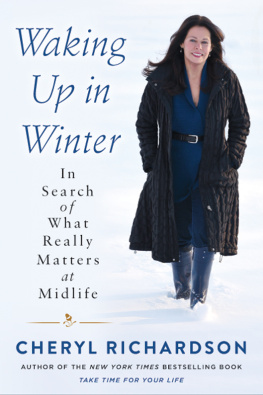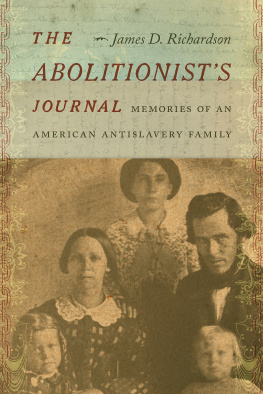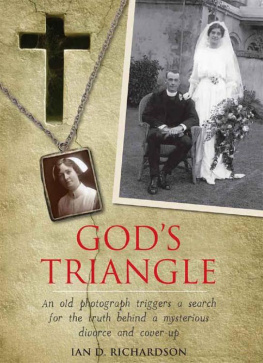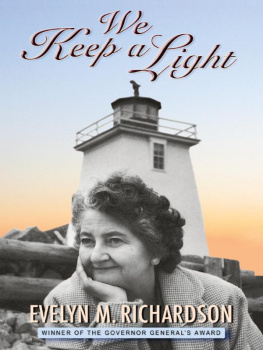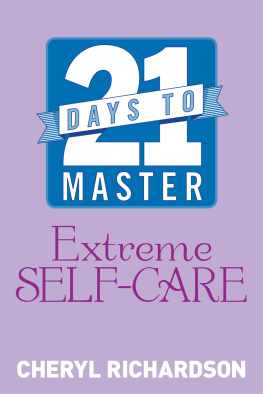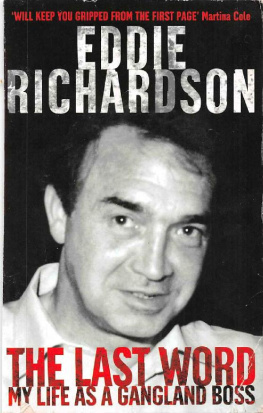In September of 2013 I was having dinner with my husband, Michael, and our good friends Bob and Melissa, when Bob happened to mention my next book. Hows the writing going? he asked, as we enjoyed a predinner drink. Making much progress? With a weak smile and a wave of my hand, I attempted to change the subject.
After publishing my sixth self-help book, You Can Create an Exceptional Life, with Louise Hay, grande dame of the mind-body-spirit field, Id spent the better part of the last two years working on my next one, but after pushing through more than a hundred pages, Id stopped. My heart wasnt in it. Writing was beginning to feel more like homework than creative expression, and I knew I owed my readers and myself more than that. My gut told me to wait, so Id put the writing on hold. Instead, I turned my attention to the body of work Id created thus far.
For years Id maintained a private practice as a professional coach, helping people to improve the quality of their lives. In writing my first two books, Take Time for Your Life and Life Makeovers, I set out to capture the process I used to help clients deal with the practical, day-to-day issues that kept them stuck in a state of overwhelm and hopelessness. I knew the first thing people needed was to get a handle on the external areas of life that dominated their time and attention. Three years later, after leading a yearlong series for The Oprah Winfrey Show and seeing the obstacles that confronted people when they faced change, I wrote my next book, Stand Up for Your Life. This time I invited readers to turn their attention inward to develop the qualities of character that would transform fear and self-doubt into personal power. With The Unmistakable Touch of Grace, I went beyond the physical and emotional aspects of life and focused on the soul. In this book, I invited readers to cultivate a relationship with the sacred dimension of life by developing spiritual skills like balancing silence with activity and the ability to surrender in the face of fear or confusion in order to gain access to wisdom and insight.
Reviewing what Id written helped me to understand my ambivalence about starting a new book. Truth be told, I not only felt like Id said all I needed to say about how to create a meaningful, fulfilling life, but I also lacked the motivation to write another self-help book. I wasnt interested in adding to the avalanche of advice that was filling my inbox and news feed nearly every day. Something had shifted in me, and I felt like an established author with a loyal following who wrote a popular blog but had nothing more to say in a book.
Or so it seemed.
Back at dinner my friend Bob pressed on. Come on, kiddo! When are we going get something to read?
I took a deep breath, ready to launch into a litany of excuses, when my husband said something interesting: You know, one thing youve always found time to do is write in your journal. Why dont you publish that? You love May Sarton, and maybe its your turn to spill the beans about the intimate life of a creative woman, but this time in the twenty-first century.
May Sarton became an important influence for me after I read her book Journal of a Solitude. First published in 1973, it gave the reader access to the private diary of a creative woman who expressed herself through poetry, fiction, and nonfiction. Id stumbled upon her journal a decade later at a small town fair as I sifted through used books piled high on tables. By age twelve Id become a voracious reader and a devoted journal keeper, and the prospect of exploring another writers life was irresistible.
From the very first page of Journal of a Solitude, I felt a kindred connection with Sarton. A keen observer of life, she wrote passionately and artistically about the world around her. Morning dew blanketing the grass in her backyard, a vase full of daffodils bathed in sunlight on her desk, or a glistening tomato freshly picked from the gardenthese ordinary snapshots of life took on new meaning under her poetic scrutiny. In addition to capturing the beauty of her surroundings, Sarton was also fiercely honest about her inner world. Throughout the journal she confessed her irritation at the demands of managing a busy household, her sadness at not being properly recognized for her work, and her frustration at navigating the tricky business of being a private woman with a public life. Sarton went on to write a series of journals, and when I finished one I turned eagerly to the next.
Michael was right. During my struggles to craft a new book, I never stopped keeping a journal. Since childhood Ive been hungry to understand myself and the world around me, and writing has been my vehicle for that exploration. Writing comforts me. It connects my head and my heart, allowing me access to hidden feelings and new perspectives. I write to make sense of the inner chaos I experience at times and to make the unconscious conscious. By processing my daily life on the page, I open myself up to insights that heal and support my growth. Keeping a journal also helps me to stay tethered to my inner life, especially when my outer life feels hectic or overwhelming.
Now, staring at my husband across the dinner table, I was surprised by the sudden rush of excitement that filled my body. Could this be the next evolution of my workgiving readers an inside look at how I actually live a life dedicated to growth and healing? Might this format be a welcomed change? In my weekly blog, Id made the shift from offering how-to advice to sharing personal stories about the ways in which I was doing my best to live a more authentic life, and readers had responded favorably. I did it because I wanted people to know they werent alone, and that in spite of my having become a recognized authority in the self-help world, the truth was I struggled, too.
Within moments of considering the idea, however, my enthusiasm gave way to doubt. Who would want to read about my daily life? What could I possibly teach readers in a journal? And even if I could pull it off, did I really want to make myself so vulnerable? What if my most intimate thoughts were met by criticism or ridicule? Or, nearly as bad, what if the book was ignored?
I spent a few days mulling over the idea, and as I did, my doubts gradually receded. Publishing a journal would give me a chance to teach by example. It would allow me to show readers how to learn from life, how to use day-to-day experiences as a catalyst for growth and empowerment. And it would also give me a chance to share the tools, support, and resources I use myself.
So it was that I decided to follow May Sartons lead. Inspired in a way I hadnt been in a long time, I went to work, and my renewed appetite for writing told me I was on the right track.
Thats how this book was born.
One of the great advantages of keeping a journal is that it provides a way to reflect on our lives. After doing this for more than forty years, Im still surprised by how a messy, nonlinear process can provide such clarity and perspective. While at the time I had no idea where this particular journal would lead, its clear to me now that these pages tell the story of what happened when I made the decision to move on from writing self-help, and in doing so discovered that there was something much bigger going on. A new awareness of my mortality had set in, and it caused me to begin reevaluating everythingmy work, my marriage, my friendships, and my prioritiesin that light. Years of success left me feeling grateful and blessed, but as I entered my fifties, I started to feel something else: anxious and unsettled. Was I really happy? Did I still feel stimulated and satisfied with my work? Now that the finish line of life was creeping closer, was I really living or just going through the motions?

